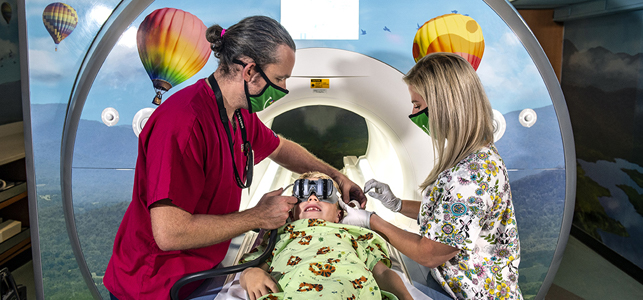
Children are at heart for young investigator Dr. Uyen Truong
Kids’ hearts require special consideration. While comprehensive care at our Children’s Hospital Foundation Heart Center includes everything from non-invasive testing and advanced cardiac imaging to diagnose problems, to precise cardiothoracic surgery on even the tiniest hearts, it goes beyond that. Through pediatric-specific research, our team is discovering the best approaches to care that will improve outcomes and allow kids to focus on doing what they do best – being kids.
Dr. Uyen Truong is one of the newest physician-scientists leading this charge – and improving health through innovation – with support from our Children’s Health Research Institute.
.jpg) Meet Uyen Truong, MD
Meet Uyen Truong, MD
Area of specialty: Cardiology
Why did you go into research?
I went into research because research is how we will get better—better at understanding pathophysiology, at diagnosis and at treatment. This is how we improve the lives of children. And, it’s exciting to be at the forefront of new discoveries.
What is your research about?
I’m studying pulmonary hypertension. Pulmonary hypertension is an incurable, progressive disease that affects both adults and children, with an annual incidence of adult disease estimated to be 50 per million and pediatric disease estimated to be 63 per million. While there are some similarities between adult and pediatric pathophysiology, the number of life-years lost in children is much greater given limited long-term survival.
Pediatric pulmonary hypertension differs from adult disease also in terms of vascular function and structure, natural history, genetics and possibly response to therapies. In pediatric pulmonary arterial hypertension, the vascular insult occurs at a critical time in development between birth and adulthood, during which time expansion of the alveolar and capillary surface area may increase by 20-fold via intussusceptive angiogenesis. Disruption of normal development results in the development of chronic pulmonary vascular disease later in life.
What kind of funding do you have?
I am currently funded by the National Institutes of Health, National Heart Lung and Blood Institute.
What is your end goal for your research?
The goal of this study is to show that MRI is a safe and accurate method to assess the cardiovascular function of children with pulmonary hypertension. Success in this study has the potential of shifting the paradigm of pediatric pulmonary arterial hypertension care towards a safer, non-invasive monitoring modality and significantly improving quality of life in children with pulmonary hypertension. Furthermore, it will add a powerful tool to push pediatric research efforts ahead, particularly in clinical trials, providing a safer means to evaluate cardiovascular and pulmonary status.
What attracted you to CHoR as a physician-researcher?
The passion and desire to expand research and the people who are doing research here.
Why is it important for children’s hospitals to support research?
Children are a unique population, distinct from adults in that disease pathology is occurring during a time of active growth and development. Children are changing, and to understand how diseases affect them we must take that into account.
Despite significant unique factors in pediatric pulmonary hypertension, research in pediatric pulmonary hypertension, compared to adults, has been stalled, forcing clinicians to use adult guidelines (including right heart cardiac catheterization for diagnosis and serial monitoring) and therapies approved for adults in children. Due to the risks of catheterization in the young, catheterization is not an option as a research tool in pediatric pulmonary arterial hypertension. Recently, the U.S. Food and Drug Administration excluded catheterization as an end-point in clinical trials in children with pulmonary arterial hypertension, making outcome studies even more difficult.
In 2011, Dr. Robyn Barst stated that evidence-based treatment guidelines in children with pulmonary hypertension lags behind that of adults by an extraordinary two decades. In fact, over the past decade, there have been five medications approved for adult pulmonary hypertension by the FDA. Only one has been approved for pediatric use.
It is the duty of pediatric health care providers to push research forward to address issues specific to children’s needs.
